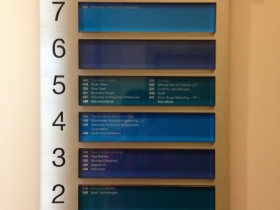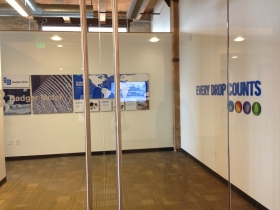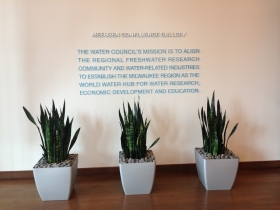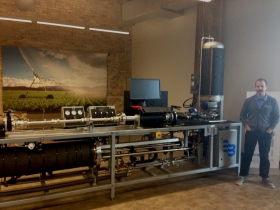Milwaukee’s Miraculous Water Hub
Almost overnight, the city has become an international leader in water technology, says the national media. Are they right?
Almost overnight, the city has become an international leader in water technology, says the national media. Are they right? Back to the full article.




























Sometimes I’ve wondered what the reality behind the hoopla is. How many companies are there? How many full-time staff do they employ? What exactly do they do? What are the short and long-term results of what they do?
I’ve felt the same. I really hope this all turns out but currently all I see is hopes and a little development in Walkers Point. Is it possible? Absolutly! But I’m afraid we’re putting the cart before the horse. Let us know once the water sector directly employs a significant percentage of the metro working population.
Skeptics have their place, but curmudgeons are not helpful and I fear that (as usual) our town has more than our share. If you expect the water technology industry to need to be a huge area employer before it can be taken seriously, it’s time for a new yardstick. Look at silicon valley — an unrivaled, massive, mature technology hub, and depending on how one measures the “tech” sector and measures the metro area, “tech” jobs are probably 15-18% of total employment in the region. That’s remarkable, but even at this mature point roughly 5 out of 6 jobs is not in that sector. The water sector is a small but growing segment with incredible potential here, one in which we have some significant advantages, not the least of which are our early start and our reputation. Milwaukee constantly fights against a negative (rust belt) reputation, or more often against no reputation at all. To dismiss the work underway to capitalize on our advantages in this field — including our reputation — is a fine marker of what holds this town back again and again.
@Dale I’d add that the Water initiative is on its way. I’m looking forward to new buildings and businesses going up in the Water Research Park starting in 2015!
I agree that the potential is great and I am pulling for it to be a huge success. I still feel like the questions above are valid, not because I am a skeptic or anything like that, but out of curiosity and a desire to know what’s going on now and what the future holds.
At least now you have to say our water initiative “looks good on paper” or on the internet. But city I am aware of in the history of humans on earth has developed a real center for an industry by promoting it. Silicon Valley came out the classes of Nobel Prize winners at Stanford.
It’s worth remembering what Edward Glaeser (the leading urban economist from Harvard) said about such initiatives like the Water Council when he was is town……
https://medium.com/@marquetteu/humanitys-greatest-invention-face-to-face-with-edward-glaeser-author-of-triumph-of-the-city-4877dbd06488
“….cities are really bad at playing venture capitalist. And most assuredly, most of the examples of trying to create clusters of a variety of forms have ended in failure. So you probably don’t want to be in the business of having a public official say, “This is our industrial future. We’re about X.”
Let me continue that quote for you “But you do want, if there is a body of knowledge in an area, you want to make sure that there aren’t barriers to turning that into jobs.”
This article is the very essence of “Milwaukee attitude”. No sense of promotion. No willingness to bump against peers to try to get on top. Just “take it easy and stay humble” which gets you nowhere.
I will build on the Silicon Valley example. Silicon Valley is the best example of how promotion and reputation breeds growth and even more reputation. Bell Labs, in New Jersey is the most important electronics institution in the history of modern computing. Austin, in Texas, is also a leader in consumer electronic innovation. Same with Chicago and New York and other pockets. Yet, Silicon Valley gets all of the tech fame because they have the best reputation.
Sometimes it doesn’t hurt to toot your own horn and hope that your reputation leads to other companies moving in and setting up shop. It’s very forward thinking and it’s great to see from the water industry.
Ah, that last sentence was rather crucial to complete the thought and for the complete context. Thank you, Tim.
My question–why doesn’t the Milwaukee Water Council use the word “industry” in its name, to be clear about what it is and does?
Water Technology or Water Sector. I just don’t understand this talk about a Fresh Water Hub. What makes this a hub? Yeah we have a Lake but what are these companies doing here and what are they researching water for? Most importantly what money are they making or have the potential to make? No one ever defines this stuff or ventures into one of these companies and finds out what an employee does all day there. I just can’t put a task in my head of what they could possibly be doing. Are they researching new ways to use it or new ways to clean it? I’m not seeing the $$$ potential here.
@Patrick, The $$$ for is huge. I think its really about managing and preserving freswater resources. That sounds simple, but it is a massive, expensive and complicated undertaking. For example, if you look at MMSD, their success is dependent on preserving, managing and cleaning water, whether its waste water from homes or run-off from precipitation. Successfully managing these resources is a massive job that requires innovation, new technologies, equipment, improved processes and public education.
Jobs in the “water sector” are extremely varied. Water saving devices in the home, roof top gardens, permeable pavers, retention systems, urban gardens, new fertilizers that don’t pollute, researchers,etc. Then you have industrial upgrades that save hundreds of millions of gallons of freshwater annually. Miller Brewery made changes that saved $80 million gallons of water a year in their Milwaukee plant alone. That means there is less water entering the sewer system, less to treat and ultimately, fewer chances of dirty water entering our rivers and streams. In addition, new equipment and processes in the agricultural industry will go a long way in reducing algea plumes that are destroying our lakes. Water impacts every household and All industries, while having a direct impact on health and quality of life. There is nothing and no one that is not impacted by the health of their water supply. Let’s not forget people that like to camp, hunt, fish and so on.
One way to look at activity is how many patents are being produced. I’m in the construction industry and we are always researching new and innovative products and better ways on controlling waste and run off. It is always a part of the conversation whenever we talk to public officials, subs, architects, engineers or owners. Reed Street Yards is going to be a working laboratory for new and innovative solutions.
A hub means that we have and are developing a cluster or critical mass of resources, expertise and companies that support each other in a common pursuit. UWM has spent millions on its freshwater school and offers a doctorate in freshwater sciences, industries in this area are dependent on large amounts of water, we have a lot of agriculture and we’re on a great lake. More importantly, there are financial resources available for innovative water focussed start ups.These processes, technologies and products can and will be exported everywhere.
I think Mr. Murphy did a nice job with his piece. Some of the comments and critics mentioned in the article are humorous and typical of any economic/community development initiative across the country might encounter. Some people take their own ignorance of the topic to ground their suspicions of the entire worthiness of the initiative. Some create straw dogs to shoot down (like it seems is the case in Marc Levine’s number game or the Chicago interest in water issues).
Nevertheless, Milwaukee does have a concentration of companies, researchers, organizations and innovators involved in the water technologies space that the Water Council is working to brand, nourish, expand, exploit and connect (locally and globally). All worthwhile pursuits in my opinion and worthy of public investment to sustain. From my own experience, I’m not sure I’d say that about many sector-based approaches adopted by other metro areas around the country.
The region’s strengths and talents in a wide array of water issues warrant promotion and publicity so Milwaukee is among the top of mind spots external companies, researchers, and other entities consider when they are thinking about new locations, talent, technology and opportunity. At the same time, I think Dean Amhaus is spot on when he says this isn’t a competition with Chicagoland. The success of Milwaukee’s companies and researchers can’t continue if they were to suddenly limit their thinking to the immediate metro area. Its an open system. Connection, collaboration, cooperation and strong linkages internal to Milwaukee and more importantly outside the area will drive results (healthy companies, expanded research funding, more employment opportunities).
I also think Amhaus, his team and the private sector leadership committed to the cause deserve credit for the work they’ve done already and the national attention they are bringing to the area. There is a reason the Water Council has been able to secure competitively awarded external support like the SBA’s grant: the cluster of water-related activities in Milwaukee is worth developing further. More local capital should be waking up to that. Sustained economic opportunity around water innovation will require more investment capital availability for early, seed and second stage technologies/companies to succeed within Milwaukee.
A sign of success is the emergence of naysayers and doubters to try to bring you down and discredit the work you are doing. The Water Council is doing tremendous job of drawing attention to Milwaukee and the southeast Wisconsin region, for the strong cluster that exists here in water technology. For those of us that live on the largest source of freshwater in the world, it is easy to take for granted this most precious natural resource, but worldwide, and even here in the United States there is a tragic water crisis that will only grow exponentially in the coming years, which requires immediate attention, which I think The Water Council is helping to do. I keep reading in the comments that “I don’t know” or “not sure” of what they are doing, in this day and age a simple google search can be employed to educate yourself, or, maybe even a visit to, wait for it, their website to answer some of your questions and doubts. There are many resources available to educate yourself on the importance of what is happening in Milwaukee, it is about time the general population pays attention and gets on board, the rest of the country and world get what is happening in Milwaukee, why is it so hard to get the locals to appreciate it? I think we would all benefit from doing a little homework and getting our facts straight before casting doubt on what could be a game-changer for Milwaukee’s economy. It’s simple, get on board or get left behind. It’s not like you’re being asked for hundreds of millions of dollars to fund an arena or streetcar system, this is a truly good thing for the city that will reap benefits for decades to come!
Good article and more success stories to be reported over next 20 years! I think everyone involved deserves kudos including Amhaus. But, you left out then Joint Finance member now Judge Pedro Colon. He fought for this in the Legislature and made sure it went on south side when locations were being discussed. I’d also give props to Kevin shafer and MMSD staff, board, et al. Along with obviously the Mayor and his team. Our water systems in Milwaukee have benefitted greatly from all those folks, and they just announced that over 99% of both sewer and storm water traffic was cleaned before returning to the ecosystem. Thats an awesome accomplishment and makes Dean’s job somewhat easier. Also helping the cause, is the widespread public and media discussion, worldwide, about near future water shortages. Coors did not buy Miller because they love 6 months of winter. Its because large swaths of the western United States are facing water shortages, which will lead to much higher costs for key businesses, like a brewery or manufacturing operations.
I went to The Water Council’s website, and it doesn’t reveal much. It says there are more than 150 water technology companies, but it doesn’t list them or say anything about what they do. It says areas of focus are water research, education, and technology development, but it doesn’t say much about how the 150+ companies are working on those focus areas. Again, being curious and wondering about what exactly the companies are doing, how many people they employ, and what the future holds does not make one a doubting naysayer. I’m happy it’s getting media love and hope it’s a huge success. I’d just like to know more, and the website doesn’t tell me much that I didn’t already know.
We have a wide array of companies in the metro area that are based in full or in part on areas related to water. There are companies that do basic things like manufacturing pumps, boilers, and metering equipment. Then we have companies that research and manufacture simple and advanced water purification systems and techniques. Next we have companies researching innovative bio-engineering problems for water remediation and reclamation. Then we get into areas such as conservation and environmental protection. Finally we have technology start-ups that are working on anything from advanced building environmental (heating/cooling) systems that are water based to simple apps for smart phones to monitor your home water use. I’m not expert, so I’m sure there is a lot more not covered here.
We already had a cluster of companies… whether it’s 50 or 200. Either way, the Water Council was created to bring in resources from academia, build an incubator to spur new businesses, and promote networking and partnerships within the hub and globally in order to leverage what we already have. Part of that is branding and marketing… in which I think they’ve done an excellent job.
I’ve concluded that economic development programs fall into 2 broad classes:
1) The steal from your neighbors in which companies set up a bidding war among states to see whose taxpayers can be most generous. They don’t really create value, just move the pieces around. I would call them zero-sum except from a taxpayer viewpoint they are negative-sum. We have seen a lot of these lately.
2) The grow-your-own approach in which entrepreneurship is encouraged. One thing I like about the Water Council is that it falls clearly into the second group.
Bruce, thanks for staying on top of this. The WC has great PR, that’s for sure. And really fancy offices. On seven floors. And a big budget. And anywhere from 50 to 194 companies doing something “related to water” in its Water Wheel of Fortune.
However, the big dollars granted to the WC shouldn’t be used to expand the definition of “related to water” so that it can add existing companies to its membership roster. There should be much more clearly defined criteria of what is the mission of the WC and better-defined criteria for membership. And in any case, the 50- – 194 manufacturers may be manufacturing products that contribute to overuse, misuse or pollution of precious water resources.
Academic research and grant money must target what hasn’t been done, what is trending, clearly identify the problems and begin postulating potential solutions. What’s missing in the discussion (and lost in the PR clouds) is innovation–innovation that must be global because the resource is global, the water shortage crisis is global, the world population is growing and the planet is drying. To be a ‘water hub’ of the stature the WC has pumped itself up to be, it needs to attract new ideas, not provide old fuddy-duddy Milwaukee companies with larger markets for their existing products and give Great Lakes access to water-dependent industries from other states.
WC only “miraculous” if a mirage is considered “miraculous”. Mirages evaporate the closer one gets/looks.
We are excited with this technology being forged here in Milwaukee and hopefully it will become the leader for global water resources that is expected of it. However, we hope that Israel becomes a greater partner here, for not only are they a leader in water tech. but they actually are THE leader in the world. Israel has some of the brightest and best minds for many technologies, such as computers, aero-space, education, the arts, agriculture. You might want to check out a new vehicle that they developed which uses water and air primarily , tied into sustaining batteries. Check out”Phinergy”, an Israeli based corp.. There are videos to demonstrate it’s use. Our Gov. Scott Walker will soon be traveling to Israel on a trade mission, which also includes Germany and Great Britain. Even in the area of getting parking paid for, they have a system that is smarter and cheaper than anything we have here in the states. Tel Aviv is putting up so many sky scrapers today, all because the technology firms need more space for the enormous growth happening in Israel. Just saying. Partnering with Israel is a great bet !
The markets for water and information technology/semiconductors are not even in the same pool. You can’t reinvent the wheel like you can with IT. Before water can be the future, the “water council” needs to think realistically. Otherwise this will remain what it currently is, an elaborate idea that can’t survive without public funding.
Water treatment processes can only be improved so many times. That technology does not change in the short term, unlike Silicon Valley, where companies are constantly innovating new products, software, gadgets, and apps that they can sell to billions of people or manufacturers. Water treatment plants use the same chemicals they did nearly 100 years ago.
Hypothetically, what is the best case scenario for a tangible product that can be sold for large profits? Water chemistry testing electronics? New filters? Meters? Pumps? Chemicals? Ideally, they could sell products made here to municipalities, but that’s a stretch. Even Badger Meter has plenty of competition for something as basic as a water meter.
The best case scenario for this project would be a private bottling water plant. While there is plenty of competition, this is the best way to get this project off of public financing. One time $500,000 grants from SBA or NSF are not going to pay the bills for long.